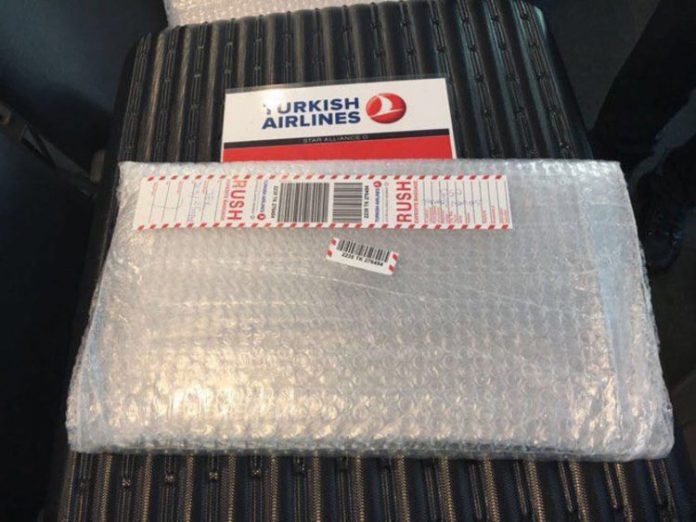Electronic devices such as laptops and tablets, must be placed in checked-in baggage on flights to the US or UK, from yesterday.
Mobile phones and medical devices, however, will be allowed in the cabin.
The US ban affects nine airlines from eight countries: Turkey, Morocco, Jordan, Egypt, the United Arab Emirates, Qatar, Saudi Arabia and Kuwait.
The British ban, meanwhile, targets flights out of Egypt, Turkey, Jordan, Saudi Arabia, Tunisia and Lebanon.
It is fear over jet bombs hidden in the devices.
This has pushed Turkish Airlines to find a solution for its passengers travelling through and from Turkey to American and British cities.
People who are not comfortable seeing their electronic devices checked in their luggage will be able to use them in the lounge and then hand their devices to Turkish Airlines officials at the boarding gate.
Turkish Airlines released photographs of their new set-up this morning.
They show a hard case that will be used to store electronic devices handed in at the boarding gate. Each device is wrapped and tagged to be stowed in the hard case.
Image Caption: Each item is wrapped before being stowed in a special cargo area
The case or cases are then taken to a special cargo area under the plane to be transported safely and then handed back to you at the baggage claim area by Turkish airlines officials.
Passengers flying with Turkish Airlines will also be given internet access onboard its flights to destinations implementing the ban.
There has been criticism of the electronics ban, with some people pointing out that many insurance companies will not insure expensive items such as laptops if they are not kept with the passenger.
By providing its new service from Istanbul Ataturk Airport, Turkish Airlines offers a “safe and secure method of carrying electronic devices in a special area in the cargo hold of the aircraft”, the airline said.
The airline offers the service to transit passengers too.
Meanwhile, Tunisia has summoned the British ambassador to the country to protest the “unjustified” ban on electronic devices on flights to the UK.
The foreign ministry’s head of European affairs, Mohamed Mezghani, told ambassador Louise de Sousa that Tunisia was “surprised” it had not been told about the ban before it was announced.
Mr Mezghani said the ban was “unjustified and does not reflect the security situation in Tunisia”.
He also said that a 2016 report by the International Civil Aviation Organisation had described airports in Tunisia as among the “safest” in the world.


























